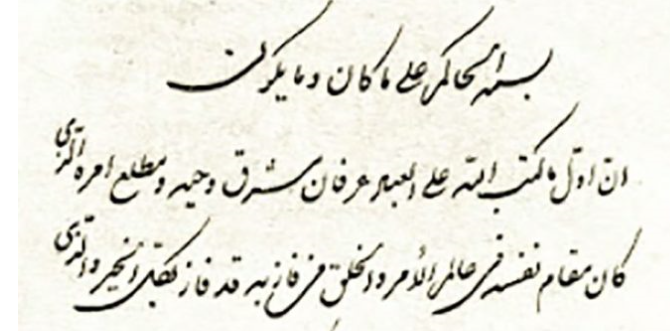
Gnosticism and the Babi-Baha'i Religions.
Gnostisism and the Babi and Baha'i Religions.
Stephen N. Lambden UC Merced.
IN PROGRESS - LAST UPLOADED 18-03-2021.
The successive and closely related Babi and Baha'i religions deriving from the Persian born `Ali Muhammad, the Bab ("Gate", 1819-1850 CE) and Husayn `Ali entitled Baha'-Allah ("The Glory of God", 1817-1892 CE), exhibit certain doctrinal features in common with streams of ancient and modern gnosticisms. Their Abrahamic, twelver Shi`i and Shaykhi Islamic backgrounds have directly or indirectly exposed them to what many would view as gnostic themes and motifs. Yet, it would probably be inappropriate to label them "gnostic" or view them as fully representative of a gnostic phenomenon. They are not simply or exactly “gnostic” movements or religions. They know of no demiurge, no denigration of the world of matter, and no pathway fit only for a gnostic elect. Unlike gnostic salvific elitism, the Baha’i religion has it that all members of the human race will eternally have an afterlife in which the spiritual progress of the soul will forever be possible in heavenly spheres beyond time and space.
Around the beginning of the common era (CE) emergent Jewish and other Hellenistic modes of gnosticism, made a good deal of the transcendent mystery or "unknowability" of the Abrahamic Godhead as a Deity to be separated and contrasted with the creator of this allegedly specious material world, the genesis of evil.
Both the Babi and Baha’i religions give a considerable centrality to (Arabic-Persian.) `irfan (loosely meaning inner knowledge or "gnosis" which has clear soteriological or salvific implications. Redemption is the acquisition, living, and dissimilation of eschatological "gnosis" which includes esoteric or (Arabic) bāṭini (Inner) epositions of dimensions of Abrahamic and other sacred scripture; including the Torah, the New Testament and the Qur'an. The importance for Baha'is of that `irfan (loosely "gnosis") which they reckon has clear soteriological importance for humankind. It is communicated through revelations (wahy + ilham) set forth in writing by Messengers or Manifestations of God (Per., mazhar-i ilahi). This importance is evident at the commencement the most important repository of Baha'i law and doctrine, the Kitab-i aqdas ("Most Holy Book") of Baha'-Allah. Therein we read, towards the very beginning of this terse, Arabic, religio-legalistic text:

In His Name, the Supreme Ruler [al-hakim, `the All-Wise One'] over all that hath been and all that is to be!
The first duty prescribed by God for His servants is the `Irfān (gnosis, recognition) of Him Who is the Dayspring of His Revelation (wahy) and the Fountain of His laws, Who representeth the Godhead in both the Kingdom of His Cause and the world of creation. Whoso achieveth this duty hath attained unto all good; and whoso is deprived thereof hath gone astray, though he be the author of every righteous deed (K-Aqdas Para 1).
Claiming to communicate new eschatological pathways to gnosis, spirituality and neo-Islamic religiosity, the Babi and Baha'i religions, like many ancient and later streams of gnosticism, celebrate the transcendent unknowability of an apophatic Deity. It is believed that this transcendent, unknowable Godhead, communicates indirectly with humankind from age to age through his theophanic manifestations (mazhar-i ilahi) or messengers. The Bab altered and replaced the Islamic basmala ("In the Name of God, the Merciful, the Compassionate") to the doubly apophatic Bismillah al-amna` al-aqdas ( "In the Name of God, the Abstracted, the Most Holy"). Human "gnosis" is the knowledge communicated by the human born though Divine Mediator. Such, for Baha'is, divinely inspired persons include (after Abraham, Zoroaster, the Buddha, Moses, Jesus, Muhammad and others) the Bab and Baha'-Allah who represent and proclaim the knowability of the infinite Names and Attributes of God. Modern Baha'is are obligated to recite a daily obligatory prayer, one short version of which has it that God created humankind for the `irfan ("knowledge") of God and the worship of their creator. The word `irfan (knowledge, gnosis, etc) occurs many thousands of times in the extensive Arabic and Persian Babi-Baha'i scripture.
Aside from or supplementary to the centrally important doctrines of the future continuity of post-Islamic religions and the oneness of humanity (and numerous associated teachings), there exist Babi and Baha'i expressions of religious gnosis or esoterica of a kind sometimes deemed "gnostic". Such deeper, `irfani ("gnostic") type doctrines include alchemy, numerology, dhikr type litanies and incantations, talismanry, typological, allegorical and other non-literal (batini) scriptural interpretations, sometimes down to the level of single scriptural words and individual letters. Such deeper Babi-Baha'i teachings can be considered as expressions of salvific "gnosis", only a few examples of which can be given here. Other acts of a moral, ethical and ritualistic spirituality are given inner senses consonant with new age "gnosis". They are designed to foster pathways leading to the oneness of humanity.
God revealed the Qur’ān according to the likeness of the creation of all things (bi-mithl khalq kulli shay’)… For every single letter of the Qur’an, as accords with its being totally encompassed by the knowledge of God, to the level of the totality of its intricacies (min dhawāt al-ashyā’), there is a tafsīr (interpretation). For every tafsīr (interpretation) there is a ta`wīl (deeper sense). For every ta`wīl there is a bāṭin level (`deep inner sense’). For every bāṭin there are also further deep inner senses (bāṭin), dimensions to the extent that God wills… (B* T-Kawthar, fol. 8b).
HERE



